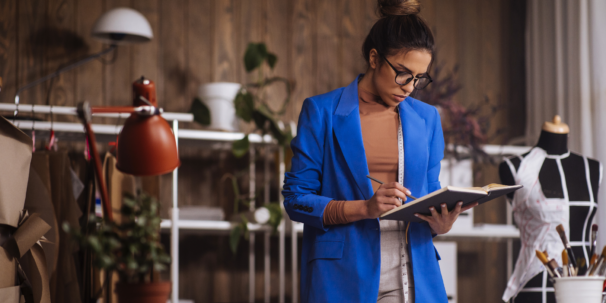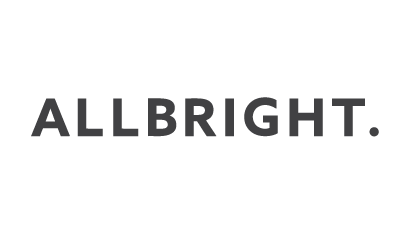Interview questions for jobs in fashion
A fashion job interview might seem daunting but it needn’t be a challenge if you’re armed with the right knowledge (and a great outfit, of course!) Read our tailored guide to get some top tips from our couture experts.

How to prepare for a fashion job interview
You’ve sent off your application and got a job interview – now what? Here, we cover six questions you’ll likely be asked when interviewing for your dream job in fashion — plus expert input on how to answer them.
Success in any interview — no matter the job — requires you to be well informed and stay on top of industry news. We’ve got more on the latter below — but for the former, the best way to keep up is through online courses. Online courses provide far-more in-depth, expert knowledge than online articles, and are updated more frequently than books. In today’s rapidly changing world — and with sustainable practices making fast inroads into the world of fashion — this is essential.
We’ve recently teamed up with Bloomsbury to launch a range of fashion courses, covering everything from design to business practices. Our Careers in Fashion series describes the daily responsibilities involved in a multitude of fashion roles across the industry. Study the course that corresponds to your role and arrive at your interview armed with priceless insider knowledge. And if you really want to impress your interviewer, check out our fashion ethics courses, which contain all the latest developments in sustainable and ethical design.
On the fashion editorial scene, it doesn’t get much bigger than Condé Nast — this publishing behemoth owns Vogue, Glamour, WIRED, Vogue Business, and Tatler. Learn straight from the source with our Future of Fashion and Media ExpertTrack, provided by Condé Nast. You’ll cover topics such as trends, branding and sustainability.
Finally, you’ll need to assemble a killer fashion interview outfit – dressing well is important for interviews in any industry but particularly this one!
In this piece for Vogue, Alexis Bennett outlines her interview fashion tips, which can be summed up as: wear what makes you feel great, but within certain parameters. Steer clear of flashy logos, avoid low necklines especially if interviewing online, consider donning a blazer, and always, always carry a great bag.
Top six interview questions and answers for fashion jobs
“Working in fashion is a dream job for so many, and this is why finding the right candidate can be so difficult for employers — there are so many applications and so many talented creatives trying to join your team,” says Laura Roncagli, founder of the MyBeautik style guide.
We asked Roncagli and two other expert followers of fashion — Laurice Wardini, co-founder of the ClothedUp website, and Shakib Nassiri, founder of WAMA Underwear — to pick their top interview questions and answers for jobs in fashion.
We’ve left out generic questions common to most interviews, such as “What are your strengths and weaknesses?” — you’ll find those in our comprehensive guide to interview questions and answers.
Read on for our six top interview questions for fashion designers – as well as for fashion merchandiser jobs, fashion stylist jobs, and any other job in the fashion industry you might be interviewing for.
Which celebrity has your favorite fashion style — and why?
“I love this question because it allows us to distinguish people who are truly passionate about the fashion industry from people who just want any job,” says Laurice Wardini.
“For a digital publication, it’s important for us to bring people onto the team who are not only skillful, but are also passionate about the industry.”
There may be a celebrity you admire whose style closely aligns with the aesthetic of the company you’re applying to — perhaps they’ve collaborated with the brand or recently featured in the magazine, for instance. If that’s the case, there’s no harm in picking them — but only if you genuinely do like their style!
You’ll get more mileage out of your answers if you steer away from obvious answers such as Audrey Hepburn and David Bowie, and instead opt for left-field choices that demonstrate the breadth of your fashion knowledge. Research you chosen celebrity’s style thoroughly and make sure you understand the range of historical and contemporary influences that led to their styling decisions.
Where do you see yourself in five years’ time?
“We love this question because we always want to bring people onto the team who have a growth mindset,” says Wardini.
Rather than parroting the obvious, “Working for you, of course!”, it’s best to be genuine here.
“Although their bigger goals would often lead them away from our company, we still love seeing employees who aren’t afraid to share their big goals,” says Wardini.
“We know employees come and go — we prefer people who are working hard towards their goals because they will likely work hard for us if we help them on the path to their goals.”
Keep your answers general, rather than company-specific. For example, say that you “see yourself in a managerial role” rather than saying that you want a specific managerial post at the company — otherwise the person interviewing you may think that you’re gunning for their job!
Tailor your answer to the company you’re interviewing with. For instance, if you’re interviewing for a role at a sustainable fashion company but eventually see yourself opening your own business, emphasise how you would make that business sustainable.


How do you keep up-to-date with the latest fashion news and trends?
“I love this question because it shows the means by which the potential employee stays up-to-date with the fashion industry,” says Wardini.
“Things change so quickly in fashion, so it’s always valuable to have people who are constantly learning and continuing to stay with the times.”
Bear in mind that you may be required to back up your answers by talking about the latest trends. If you’re not already keeping as up-to-date as you should be, this will require advance preparation. Subscribe to the biggest fashion magazines, by all means — but the majority of publications and influencers are reacting to news and trends rather than breaking them, so you need to find the trends at their source.
In most cases, this will be runway collections — you’re bound to impress an interviewer if you tell them you were in the crowd at your local Fashion Week! It’s difficult to get into these events, though, so you can instead watch livestreams and keep tabs on the reporters covering these events.
Trade publications are magazines and websites published specifically for the people who work in an industry, and are often the source of stories broken by mainstream outlets. Women’s Wear Daily is the best-known trade publication in the US. In the UK, it’s Business of Fashion (subscription required).
And if you really want to get to the heart of where trends originate, and why, check out FutureLearn’s course on fashion trend forecasting, which lays out how professional trend forecasters stay up-to-date.




What publications do you read?
At first glance, this popular question appears almost identical to the question on fashion trends — but where you might consult more generic titles for the first, this question is more about you — and how well you’ll fit in with the company’s values.
“I think my favorite question to ask has to be, ‘What websites, blogs or magazines do you read?’” says Laura Roncagli.
“This sets the tone for exploring what fashion niche they are into, tells you whether they actually keep up to date with fashion news, and whether they are passionate. If they say something quite broad — such as Vogue — this is totally fine, but I am looking for answers that are more suited to my fashion brand.”
As long as your answers align with the company’s values, don’t be afraid to go niche with this one — think about bloggers, editors and writers whose work you really admire, and be prepared to explain why at length.
Why do you want to work in fashion?
“I also like to ask candidates what made them choose a job in the fashion industry,” says Roncagli.
“So many people are only in this for the free clothes and Instagram followers. I am looking for answers related to events in their life that made them choose a life dedicated to fashion.”
Think about the pivotal moments in your life that led you to this point. Was there someone — either someone you know, or someone in the public eye — who inspired you to pursue a job as a fashion designer, stylist, buyer, or another fashion career? Were you captivated by fashion at school? Why?
The fashion industry can be a force for good: providing a creative outlet during difficult times, helping the marginalised to express their identity, or educating people on the benefits of sustainable living through recycling and rental. Think about which of these resonate with you, and work them into your answer.
What can you contribute to our company/brand?
“I like this question because it allows me to have an idea of how someone sees themselves fitting into our company,” says Shakib Nassiri.
“It tells us whether our brand culture aligns with theirs, their approach to being a team player, how strong their work ethic is, and how can they be an asset to our company.”
This question is a take on “what are your strengths?” — but it asks you to focus more specifically on how your strengths apply to the company. Make sure you give specific examples of how you contributed to previous employers, but steer clear of criticism — don’t say, “I think I could improve how you do X and Y,” for instance.
Final thoughts
It’s never been a more exciting time to have a job in the fashion industry — be that a job in fashion designing, or another fashion job that gives you the chance to change the industry and make it more sustainable. Stay informed, and you’ll have a great chance of nailing that interview and getting the career you want.











